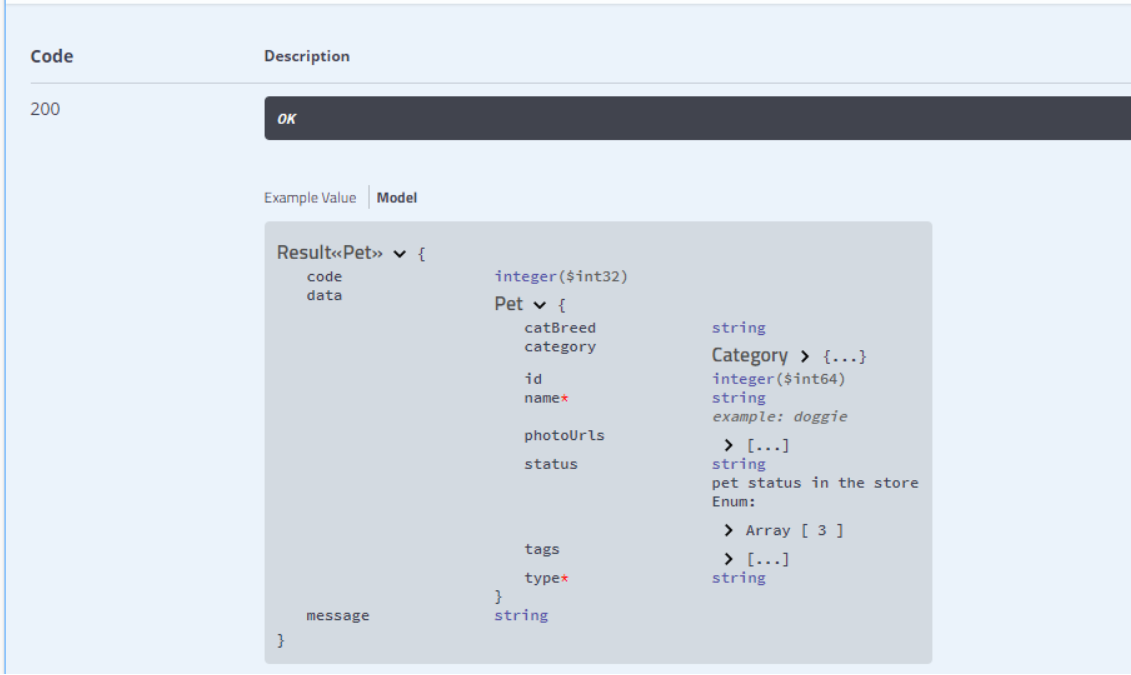Swagger注释API :@ApiModel
1.API详细说明
注释汇总
| 作用范围 | API | 使用位置 |
|---|---|---|
| 对象属性 | @ApiModelProperty | 用在出入参数对象的字段上 |
| 协议集描述 | @Api | 用于controller类上 |
| 协议描述 | @ApiOperation | 用在controller的方法上 |
| Response集 | @ApiResponses | 用在controller的方法上 |
| Response | @ApiResponse | 用在 @ApiResponses里边 |
| 非对象参数集 | @ApiImplicitParams | 用在controller的方法上 |
| 非对象参数描述 | @ApiImplicitParam | 用在@ApiImplicitParams的方法里边 |
| 描述返回对象的意义 | @ApiModel | 用在返回对象类上 |
@RequestMapping此注解的推荐配置
value
method
produces
示例:
@ApiOperation("信息软删除") @ApiResponses({ @ApiResponse(code = CommonStatus.OK, message = "操作成功"), @ApiResponse(code = CommonStatus.EXCEPTION, message = "服务器内部异常"), @ApiResponse(code = CommonStatus.FORBIDDEN, message = "权限不足") }) @ApiImplicitParams({ @ApiImplicitParam(paramType = "query", dataType = "Long", name = "id", value = "信息id", required = true) }) @RequestMapping(value = "/remove.json", method = RequestMethod.GET, produces = MediaType.APPLICATION_JSON_UTF8_VALUE) public RestfulProtocol remove(Long id) {
@ApiModelProperty(value = "标题") private String title;
@ApiImplicitParam
| 属性 | 取值 | 作用 |
|---|---|---|
| paramType | 查询参数类型 | |
| path | 以地址的形式提交数据 | |
| query | 直接跟参数完成自动映射赋值 | |
| body | 以流的形式提交 仅支持POST | |
| header | 参数在request headers 里边提交 | |
| form | 以form表单的形式提交 仅支持POST | |
| dataType | 参数的数据类型 只作为标志说明,并没有实际验证 | |
| Long | ||
| String | ||
| name | 接收参数名 | |
| value | 接收参数的意义描述 | |
| required | 参数是否必填 | |
| true | 必填 | |
| false | 非必填 | |
| defaultValue | 默认值 |
paramType 示例详解
path
@RequestMapping(value = "/findById1/{id}", method = RequestMethod.GET, produces = MediaType.APPLICATION_JSON_UTF8_VALUE) @PathVariable(name = "id") Long id
body
@ApiImplicitParams({ @ApiImplicitParam(paramType = "body", dataType = "MessageParam", name = "param", value = "信息参数", required = true) })
@RequestMapping(value = "/findById3", method = RequestMethod.POST, produces = MediaType.APPLICATION_JSON_UTF8_VALUE, consumes = MediaType.APPLICATION_JSON_VALUE)
@RequestBody MessageParam param
提交的参数是这个对象的一个json,然后会自动解析到对应的字段上去,也可以通过流的形式接收当前的请求数据,但是这个和上面的接收方式仅能使用一个(用@RequestBody之后流就会关闭了)
header
@ApiImplicitParams({ @ApiImplicitParam(paramType = "header", dataType = "Long", name = "id", value = "信息id", required = true) })
String idstr = request.getHeader("id");
if (StringUtils.isNumeric(idstr)) {
id = Long.parseLong(idstr);
}
Form
@ApiImplicitParams({ @ApiImplicitParam(paramType = "form", dataType = "Long", name = "id", value = "信息id", required = true) })
@RequestMapping(value = "/findById5", method = RequestMethod.POST, produces = MediaType.APPLICATION_JSON_UTF8_VALUE, consumes = MediaType.APPLICATION_FORM_URLENCODED_VALUE)
2.下面重点介绍@ApiModel
@ApiModel这个注解是比较重要的一个注解。因为在实际的开发过程中,我们知道了请求的地址后,我们更加重要的是关心这个接口的请求入参和返回值。
而对于@ApiModel这个注解,可以良好的展示出请求参数的含义和返回参数的含义。
源码展示:
import java.lang.annotation.ElementType; import java.lang.annotation.Inherited; import java.lang.annotation.Retention; import java.lang.annotation.RetentionPolicy; import java.lang.annotation.Target; /** * Provides additional information about Swagger models. * <p> * Classes will be introspected automatically as they are used as types in operations, * but you may want to manipulate the structure of the models. */ @Target({ElementType.TYPE}) @Retention(RetentionPolicy.RUNTIME) @Inherited public @interface ApiModel { String value() default ""; String description() default ""; Class<?> parent() default Void.class; String discriminator() default ""; /** * An array of the sub types inheriting from this model. */ Class<?>[] subTypes() default {}; /** * Specifies a reference to the corresponding type definition, overrides any other metadata specified */ String reference() default ""; }
@ApiModel这个注解
这个注解的是作用在类上面的,是用来描述类的一些基本信息的。下面,我们会逐个的进行讲解。
value属性
这个属性,提供的是类的一个备用名。如果我们不设置,那么默认情况下,将使用的是class类的名字。
description属性
对于类,提供一个详细的描述信息
parent属性
这个属性,描述的是类的一些父类的信息。
discriminator属性
这个属性解释起来有些麻烦,因为这个类主要是体现出了断言当中。
subTypes属性
举个实例,如果我们此时有一个父类Animal。同时,对于这个父类,我们的系统中有这个类的子类Cat、Dog、Pig等。如果我们在我们的父类上,通过这个属性,指定了我们想要使用的子类的话,那么在生成Swagger的文档的话,会自动的展示的是Animal这个属性,但是在属性的字段中,会显示出子类的一些独有的属性,其实在这里,是不推荐使用的。因为这样会让别人认为,这些子类独有的属性,也是父类才有的。
假如我们有如下的几个类:
Pet类:
@ApiModel(value = "Pet", subTypes = {Cat.class},discriminator = "type") public class Pet { private long id; private Category category; private String name; private List<String> photoUrls = new ArrayList<String>(); private List<Tag> tags = new ArrayList<Tag>(); @ApiModelProperty(value = "pet status in the store", allowableValues = "available,pending,sold") private String status; public long getId() { return id; } public void setId(long id) { this.id = id; } public Category getCategory() { return category; } public void setCategory(Category category) { this.category = category; } @ApiModelProperty(example = "doggie", required = true) public String getName() { return name; } public void setName(String name) { this.name = name; } public List<String> getPhotoUrls() { return photoUrls; } public void setPhotoUrls(List<String> photoUrls) { this.photoUrls = photoUrls; } public List<Tag> getTags() { return tags; } public void setTags(List<Tag> tags) { this.tags = tags; } public String getStatus() { return status; } public void setStatus(String status) { this.status = status; } private String type; @ApiModelProperty(required = true) public String getType() { return type; } public void setType(String type) { this.type = type; } }
Cat类
import javax.xml.bind.annotation.XmlRootElement; public class Cat extends Pet { String catBreed; public String getCatBreed() { return catBreed; } public void setCatBreed(String catBreed) { this.catBreed = catBreed; } }
接口类
public interface OrderWebApi { @RequestMapping(value = "/shen/testOne",method = RequestMethod.GET) Result<Cat> getOrderDetail(@RequestParam("order_id") Integer orderId); }
真正的Controller类
@RestController public class OrderWebController implements OrderWebApi { @Override public Result<Cat> getOrderDetail(Integer orderId) { System.out.println(orderId); OrderWebResVo orderWebResVo = new OrderWebResVo(); orderWebResVo.setAb(SexEnum.MAN); orderWebResVo.setAge(20); orderWebResVo.setMoney(4000L); orderWebResVo.setMoneyOne(3000.0F); orderWebResVo.setName("shen"); orderWebResVo.setSex(new Byte("1")); Result<Cat> result = new Result<>(); result.setCode(20080); result.setMessage("SUCCESS"); result.setData(new Cat()); return result; } }
Swagger文档为

reference属性
指定对相应类型定义的引用,覆盖指定的任何其他元数据。
总结
这个注解主要讲解的是model的信息信息。



 浙公网安备 33010602011771号
浙公网安备 33010602011771号